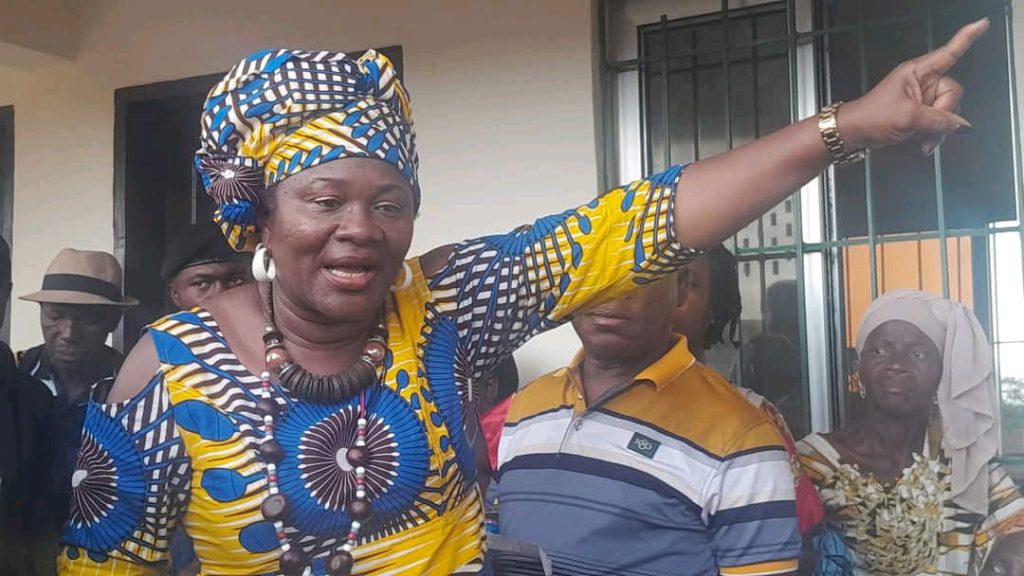The serene landscape of Bong County, Liberia, is being overshadowed by a brewing political storm. At the center of the controversy is a proposed US$280,000 renovation of the Presidential Palace, a project championed by Superintendent Hawa Loleyah Norris and the Bong County Local Government Council. Funded by the county’s development budget, the project has ignited fierce opposition from local citizens and activists, including Aaron V.G. Juakollie, Executive Director of the Foundation for International Dignity (FIND). Juakollie has publicly condemned the allocation, labeling it a blatant misuse of public funds and vowing legal action against Norris, the council members, and the local government if they proceed with the renovation.
Juakollie’s contention rests on the argument that the Presidential Palace’s upkeep is the responsibility of the national government, not the financially strained citizens of Bong County. He argues that these funds are critically needed for essential services such as schools, clinics, and roads, representing the true needs of the Bongese people. His accusations against Superintendent Norris and Council Chairperson Aaron Sackie-Fenlah suggest a conspiracy to divert public resources for personal political gain, further intensifying the public outcry. The threat of mass protests and civil disobedience underscores the depth of public discontent and the potential for escalating tensions within the county.
This controversy unfolds against the backdrop of a meticulously crafted four-year development agenda validated by the Bong County local leadership in November 2024. This agenda, spearheaded by Superintendent Norris and Chairman Sackie-Fenlah, outlines 25 priority projects focused on addressing critical developmental challenges in the region. Aligned with the Local Government Act of 2018 and Liberia’s Vision 2030, the agenda emphasizes decentralized governance, participatory planning, and sustainable economic growth. Ironically, the contentious Presidential Palace renovation appears to contradict the spirit of this development plan, prioritizing a project perceived as benefiting political elites over the broader needs of the community.
The development agenda itself is structured around key pillars: Economic Transformation, Infrastructure Development, Rule of Law, and Human Capital Development. Under Economic Transformation, the focus lies on boosting agricultural productivity through programs aimed at increasing crop and livestock production, improving storage facilities, and facilitating access to financial resources for farmers. Infrastructure Development prioritizes the construction and rehabilitation of roads and bridges, the expansion of electricity access, and improvements to housing, water, and sanitation infrastructure.
The Rule of Law pillar emphasizes strengthening security and justice systems, including increased personnel deployment, efficient case adjudication, and improved facilities for security and justice agencies. Finally, Human Capital Development centers on improving health and education services. This includes expanding and modernizing healthcare facilities, enhancing maternal care, and bolstering educational infrastructure, teacher training, and the provision of learning materials. This comprehensive agenda reflects a commitment to addressing the fundamental needs of the Bong County population, making the allocation of substantial funds to the Presidential Palace renovation even more contentious.
The absence of projects under the pillars of Sustainable Environment and Anti-Corruption and Governance within the four-year plan raises further questions. While the other pillars address crucial development needs, the omission of these two areas could be perceived as a potential vulnerability in the overall strategy. A robust focus on environmental sustainability is critical for long-term development, especially in a resource-rich country like Liberia. Similarly, addressing corruption and promoting good governance are essential for ensuring that development efforts are effective and transparent, benefiting the intended recipients rather than being siphoned off through corrupt practices.
The controversy surrounding the Presidential Palace renovation highlights a critical tension between local needs and national priorities, raising fundamental questions about resource allocation and the role of local government in development planning. The threat of legal action and civil disobedience from FIND and other activists underscores the importance of transparency, accountability, and community engagement in the decision-making process. The unfolding events in Bong County will undoubtedly serve as a crucial case study in Liberia’s ongoing journey toward decentralized governance and sustainable development. The resolution of this conflict will have significant implications for the future of Bong County and may set a precedent for how similar disputes are handled across the nation.


